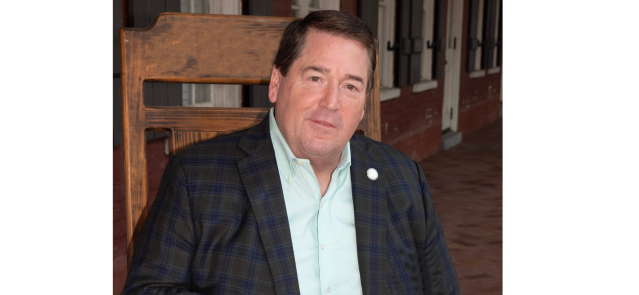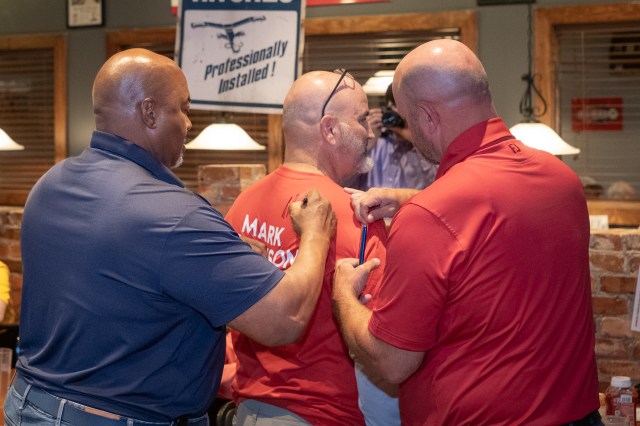INDIANAPOLIS — That flopping sound you may have heard over Labor Day weekend probably wasn’t a fish in the bottom of your bass boat. It was Donald Trump’s kaleidoscopic meanderings on the abortion issue.
That sound of a flight taking off? That would be the Kamala Harris campaign’s new trajectory after a spate of post-convention polls show her trend lines improving, even if she didn’t get that Democratic National Convention “bump.”
The cha-ching you may have heard is more big donation cash spilling into Republican Mike Braun’s gubernatorial campaign. He had a $227,910 to $10,000 advantage over Democrat Jennifer McCormick in large donations reported to the Indiana Election Division in the last two weeks of August.
And that rush of hot air off Lake Michigan? That was the Randy Niemeyer campaign plaintively protesting U.S. Rep. Frank Mrvan’s stance on not debating in the state’s sole competitive congressional race. Niemeyer is attempting to do what no Hoosier congressional candidate has done since 2010: knock off an incumbent from the other party.
These are the emerging story lines as we crossed the Labor Day campaign threshold. Only 61 days remain before the Nov. 5 election in what has been a sensationally twisting and churning political environment.
Here is our take on the political dynamics in play.
Trump and abortion
Trump grappled with the question of whether he will vote for Florida’s abortion referendum. He argued that the Sunshine State’s six-week ban on abortion was too strict and claimed on social media his administration would be “great for women and their reproductive rights.” He later said he would vote no on a referendum that would overturn the Florida law and protect abortion access. And Trump vowed to have the federal government cover the cost of in vitro fertilization treatments if he is elected.
“This has killed the enthusiasm of Trump’s own base,” anti-abortion activist Lila Rose posted on X.
According to Taegan Goddard’s Political Wire, Trump “appeared to change his mind at least three times over the weekend on how he would vote for a referendum in Florida on abortion rights. His flip-flopping shows again how the GOP wildly miscalculated the popularity of abortion rights. Voters already don’t trust Trump on abortion rights. His only hope at this point is to change the subject, not try to find the ‘right’ position.”
Goddard reported there’s been a dramatic surge of women registering to vote since Harris became the Democratic nominee. That could amplify the “Dobbs effect” we’ve seen in elections since the Supreme Court repealed Roe v. Wade.
According to new CNN polls conducted by SSRS in the seven battleground states published Wednesday, Harris holds an advantage over Trump among likely voters in Wisconsin and Michigan while Trump has the edge in Arizona. The two split likely voters almost evenly in Georgia, Nevada and Pennsylvania.
“Harris’ emergence as the Democratic Party’s presidential nominee … has altered some dynamics in the race but left others intact,” CNN reported. “Economic issues, which posed a notable weak point for Biden, remain the topic most often chosen by voters when asked what matters to their choice for president. Harris now trails Trump on trust to handle the economy by relatively smaller margins than Biden did; across the current polls, Trump is more trusted than Harris on the economy by 8 points on average. …
“Across each of them, an average of 15% of likely voters say they have not yet firmly decided their choice, suggesting a sizable share of voters could shift their views.”
Former Vice President Mike Pence told Fox News earlier this week: “During my presidential campaign I made it clear there were profound differences, like his starting to shy away from his commitment to the sanctity of human life. Donald Trump is articulating an agenda that is at odds with the conservative agenda that we governed on during our four years.
“I cannot in good conscience endorse Donald Trump in this campaign,” Pence concluded. “Republican primary voters have made it clear who they are for in this election. What I’m going to spend time doing is saying what we should be for and that is the broad, mainstream conservative agenda that’s defined our party.”
Asked who he would vote for in November, Pence said, “Like most Americans, I’m going to keep my vote to myself.”
Presidential campaign
Here are elements to watch:
According to the FiveThirtyEight polling composite, Harris leads Trump 47.1% to 43.9% in national polls. According to RealClearPolitics, Harris leads Trump in the polling composite 48.1% to 46.2%.
In the RealClearPolitics battleground state composites, Trump leads in Arizona and North Carolina, and the two are tied in Pennsylvania. Harris leads in Nevada, Wisconsin, Michigan and Georgia. All these composites are within the margin of error.
1. Can Harris sustain the momentum streak she’s been on since President Joe Biden ended his reelection bid July 21? In addition to vowing to politically prosecute her case against Trump, she has been accentuating her support of abortion rights. She has turned the 78-year-old Trump’s age into an asset. The Harris campaign says she is still the “underdog.”
2. Will next Tuesday’s prime-time debate be a turning point? The June 27 Biden-Trump debate became a dramatic game changer. Republican pollster Frank Luntz believes Trump can win this debate by echoing the 1980 Ronald Reagan debate question, “Are you better off than you were four years ago?” Harris has focused on the economy, tacking to the center.
3. Can Trump tie Harris to the Biden administration? The last time a Democratic nominee didn’t go through the primary process in 1968, Hubert Humphrey lost because he could not escape the legacy of President Lyndon B. Johnson’s administration. Trump will seek to tie Harris to Biden, though his approval ratings have improved recently.
4. Finally, former GOP strategist Stuart Stevens has likened the Trump campaign to a paper bag filled with water. “Trump lost by 7 million votes [in 2020],” Stevens told MSNBC’s Ali Vitali. “He needs new customers. What is he doing to attract new customers? Even when it was versus Biden after that bad debate, he still had trouble moving north of 47%. I think the more likely scenario is that this race is gonna be close until maybe Oct. 20, 25, and then I just think the bottom is gonna start to drop out for Trump because he’s not acquiring new voters. This is what happened to Carter in ’80, and I think there’s a lot of similarities here.”
Indiana gubernatorial race
Braun will begin a $500,000 statewide TV ad buy today, running for the next 10 days. It is his first general election campaign ad.
McCormick posted a TV ad on X asking supporters to help fund a media buy.
Braun continues to build a money advantage, adding $227,000 in the final two weeks in August in large donations. Labor Day is a traditional rallying point for Democratic nominees, but unions are not playing a significant funding role for this Democrat. McCormick brought in $10,000 from the International Brotherhood of Electrical Workers PAC Voluntary Fund. She is not running TV ads.
Her recent tax plan has generated better reviews than those from Braun and Libertarian nominee Donald Rainwater. Ball State economist and Howey Politics Indiana/State Affairs columnist Michael J. Hicks believes McCormick presented a more credible plan.
“They propose cutting property taxes by roughly the same amount as the Braun/Beckwith plan, but doing so in a way that doesn’t shift tax liability to farmers, renters or businesses,” Hicks said. “They also ensured that local governments — schools, libraries, police and fire departments, and parks — would not face deep revenue losses.”
Democratic sources tell Howey Politics Indiana/State Affairs that recent polling shows McCormick outperforming some party legislative nominees. But the campaign and Indiana Democrats are holding any internal polling close to their vests.
Later today, McCormick will hold a virtual news conference to release the McCormick-Goodin Commonsense Ethics Plan.
“Hoosiers deserve a transparent, ethical government above reproach,” McCormick said in a statement. “It is time we restore the confidence, faith, and trust between Hoosiers and the people elected to serve them.”
Here are recent large donations:
McCormick (D): IBEW PAC Voluntary Fund, $10,000 (Aug. 29).
Terry Goodin (D): No large donations reported.
Braun (R): Clinton Smith, $10,410 (Aug. 29); Doug Rose, $22,500 (Aug. 28); Michael Wells, $10,000 (Aug. 27); Andrew Held, $10,000 (Aug. 27); Indiana Multi-Family Housing PAC, $50,000 (Aug. 26); Trucking Industry PAC, $10,000 (Aug. 26); Business Advocacy Committee, $25,000 (Aug. 26); Geenex Solar LLC, $10,000 (Aug. 26); Bryan T. Barrett, $10,000 (Aug. 26); Northern Indiana Operators Joint Labor-Management PAC, $30,000 (Aug. 26); Eric Doden, $10,000 (Aug. 20); R. Bruce Dye, $10,000 (Aug. 20); Sweitzer Family Office LLC, $15,000 (Aug. 20); Billy Bean, $15,000 (Aug. 20); Thomas W. Kelley, $10,000 (Aug. 20).
Micah Beckwith (R): Brian Furrer, $10,000 (Aug. 25).
Rokita has huge money lead
Democratic attorney general nominee Destiny Wells has raised $150,592 on top of the $55,295 she had on hand at the beginning of the year. She had a June 30 ending balance of $97,960. Her last large donation of $10,000 was posted July 23.
Attorney General Todd Rokita began the year with $1.081 million, has raised $483,624 and had a June 30 ending balance of $1.31 million; he’s since added $500,000 in large donations. On Aug. 22, the Republican Attorneys General Association Action Fund gave him $250,000. On Aug. 15, W. Mark Lanier of Houston contributed $100,000 and Robert L. Salim of Louisiana contributed $50,000.
Rokita remains a prohibitive favorite for reelection.
U.S. Senate red wall
U.S. Rep. Jim Banks has $5.55 million in total receipts and $3.17 million cash on hand. Democratic nominee Valerie McCray has raised $61,506, which trails former candidates Keith Potts ($99,485) and Marc Carmichael ($115,161). She had $15,684 cash on hand as of June 30. Rack this one up in the red column.
Congressional drought continues
The last Indiana congressional seat to change parties with an incumbent defeat occurred in 2010 when Republican Todd Young defeated Democratic U.S. Rep. Baron Hill in the 9th Congressional District (Republican Jackie Walorski switched the 2nd CD from blue to red when Rep. Joe Donnelly ran for the Senate in 2012).
This is the longest stretch in Indiana history with the lack of congressional turnover. The gerrymandered maps of 2011 and 2021 have done what Republicans intended, which is to stymie competition and keep incumbents safe.
We’re keeping an eye on the 1st Congressional District, where Lake County Councilman Randy Niemeyer is challenging two-term U.S. Rep. Frank Mrvan, who appears to be resisting debates.
Mrvan posted $2.3 million in total receipts for the cycle and had $1.47 million cash on hand as of June 30. Niemeyer had $645,359 in total receipts and an ending balance of $446,528 on June 30. We believe Rep. Mrvan is in good shape for reelection.
General Assembly updates
Perhaps fewer than 10 Indiana House seats are in serious play as Re- publicans have strong prospects of extending their supermajority hold through a seventh election cycle since capturing it in 2012.
The current 70-30 Republican majority means Democrats need to pick up four seats toward the goal stated by party Chair Mike Schmuhl of
breaking the two-thirds supermajority. Among the House district races considered the tightest are those now held by Republican Reps. Becky Cash and Dave Hall and Demo- cratic Rep. Wendy Dant Chesser (who won a party caucus to replace Rep. Rita Fleming following her resignation in May).
Senate Democrats, meanwhile, are unlikely to cut into the current 40-10 Republican margin in that chamber.
Brian A. Howey is senior writer and columnist for Howey Politics Indiana/State Affairs. Find Howey on Facebook and X @hwypol.











 Save the Date
Save the Date